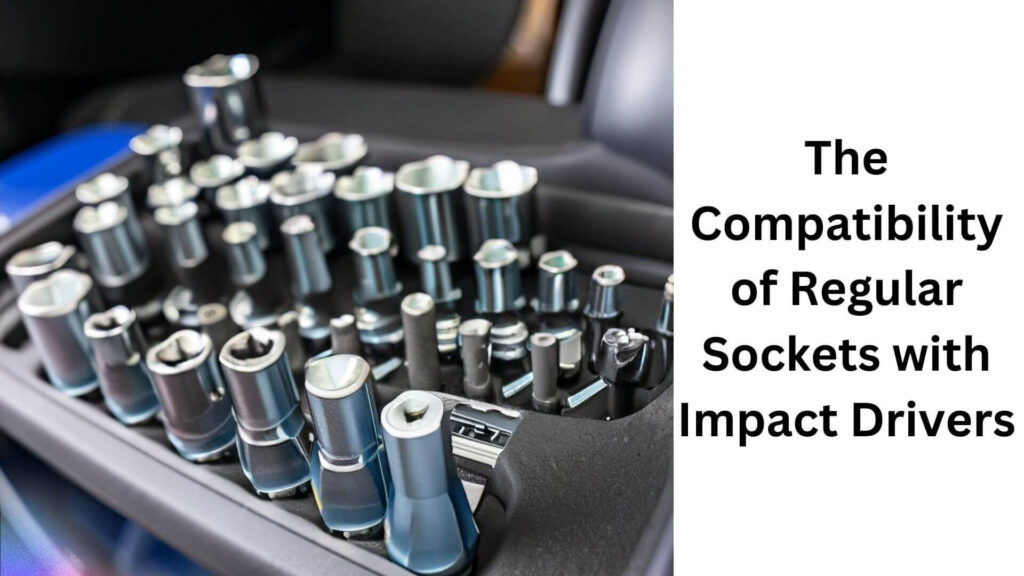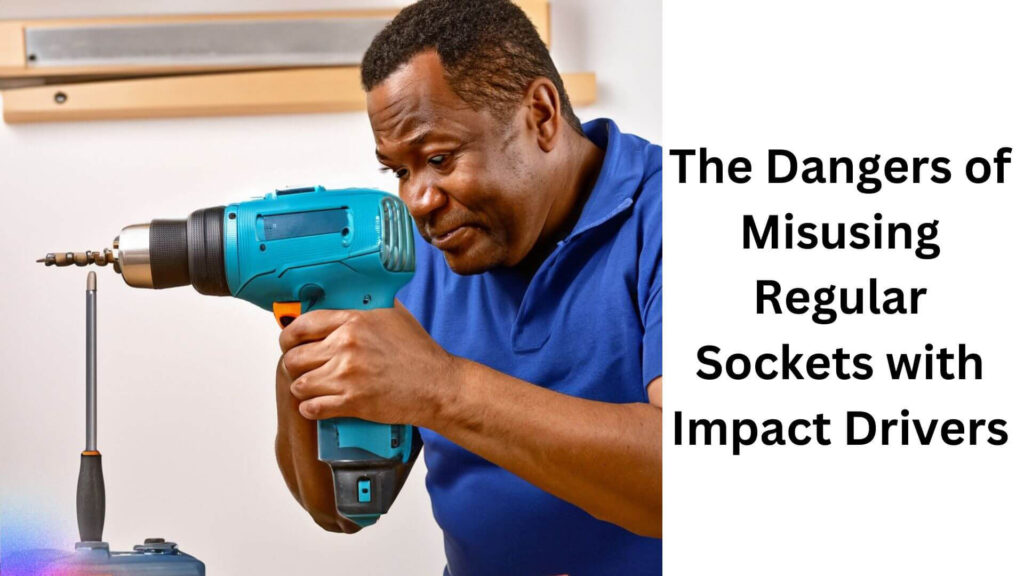No, regular sockets should not be used on an impact driver. Impact drivers require specially designed sockets that withstand high torque and prevent shattering and breaking.
Regular sockets lack the strength and flexibility to handle the intense power generated by impact drivers and can result in severe injury or damage to the tool. Investing in the right toolkit and keeping yourself safe when using any power tool is essential.
This article explores impact drivers, their unique requirements, and the differences between impact sockets and regular sockets. I’ll also share tips on choosing the right socket for your impact driver and common misconceptions about compatibility.
Table of Contents
Can You Use Regular Sockets On An Impact Driver? – Understanding the Basics
Before I delve into the main question, let’s understand the basics of impact drivers and regular sockets. An impact driver is a power tool designed to deliver high torque, primarily used for driving screws and bolts into various materials, such as wood, metal, or concrete.
On the other hand, a regular socket is a versatile tool used with a ratchet or wrench to tighten or loosen nuts and bolts.
The critical difference lies in their mechanism. Impact drivers use a combination of rotational force and concussive blows to generate high torque, while regular sockets rely on the user’s manual power to turn the fastener.
Due to this fundamental difference, examining whether using standard sockets on an impact driver is safe and efficient is essential.
Regular Sockets Vs. Impact Sockets
| Aspect | Regular Sockets | Impact Sockets |
| Design | Designed for use with hand ratchets or wrenches | Specifically designed for use with impact drivers |
| Material | Generally made from standard steel alloys | Made from more challenging materials like chromoly steel |
| Mechanism | It relies on the user’s manual force to turn fasteners | Withstands intense torque and concussive blows |
| Usage | Suitable for regular hand tool applications | Ideal for heavy-duty tasks and impact driver use |
| Compatibility | Safe to use with standard ratchets and wrenches | Unsafe for use with impact drivers |
| Strength and Durability | May wear or crack under impact driver force | Resistant to impact driver force and vibrations |
| Socket Failure Risk | Low | High |
| Application | Versatile, but not recommended for impact drivers | Specifically designed for impact drivers |
| Price | Generally more affordable | Slightly more expensive due to the specialized design |
Factors To Consider When Using Regular Sockets On An Impact Driver
Despite the risks involved, several factors need careful consideration if you decide to use regular sockets on an impact driver.
- Firstly, check the material and strength of your regular socket. Opt for higher-grade chrome vanadium steel options, which offer better durability than cheaper alternatives.
- Secondly, consider the power and torque of your impact driver. Higher-powered models generate greater rotational force, which can stress regular sockets more. It is advisable to use lower torque settings or select specific tasks where lower torque requirements apply when using standard sockets with an impact driver.
- Lastly, ensure proper socket fitment and retention by using adapters if necessary. Socket adapters allow regular sockets to securely attach to an impact driver’s chuck, minimizing the risk of slippage or detachment during operation.
However, using adapters may slightly reduce the overall performance and efficiency of the impact driver.
Read More: Can a Cordless Impact Driver Remove Lug Nuts?
The Compatibility of Regular Sockets with Impact Drivers

Using regular sockets on an impact driver is generally not recommended. The impact mechanism of an impact driver can exert tremendous force, which may lead to the failure of a regular socket.
Regular sockets are not designed to withstand the intense torque produced by an impact driver, and using them in such a manner can result in premature wear, cracking, or even shattering of the socket.
The Dangers of Misusing Regular Sockets with Impact Drivers

Misusing regular sockets with impact drivers can lead to various hazards:
- Socket Failure: As mentioned earlier, the intense force generated by an impact driver can cause a regular socket to fail, posing a risk to the user’s safety and causing damage to the tool.
- Personal Injury: In case of socket failure, pieces of the socket can fly off, leading to potential injuries to the user or bystanders.
- Tool Damage: Continued use of regular sockets on an impact driver can damage the driver’s anvil, impacting its performance and longevity.
- Fastener Damage: The powerful torque of an impact driver can easily damage or strip the heads of fasteners when used with regular sockets, making them challenging to remove.
Using Impact-Rated Sockets
To ensure both safety and efficiency, it is crucial to use impact-rated sockets designed explicitly for use with impact drivers.
Impact-rated sockets are constructed from more challenging materials that can withstand the force and vibrations produced by the impact driver. These sockets have a thicker build and are less likely to fail under pressure.
When shopping for impact-rated sockets, look for those made from chrome molybdenum (Chromoly) steel or other high-strength alloys. They often have a black oxide finish, providing corrosion resistance and durability.
Bonus Tips for Using Impact Drivers and Impact Sockets
Using an impact driver with the appropriate impact-rated sockets can significantly enhance your work experience. Here are some valuable tips for using impact drivers and impact sockets effectively:
- Select the Right Socket Size: Ensure the impact-rated socket fits the fastener snugly. An improper fit can lead to rounding off the fastener’s head and diminish the tool’s effectiveness.
- Use the Right Adapter: If you need to use regular sockets on other tools, use a proper adapter. However, avoid using standard sockets with your impact driver, even with an adapter.
- Wear Safety Gear: Always wear appropriate personal protective equipment, including safety glasses and gloves, while operating an impact driver.
- Inspect Sockets Regularly: Check your impact-rated sockets for signs of wear, cracking, or damage. Replace any damaged sockets immediately.
- Apply Adequate Lubrication: Regularly lubricate your impact sockets to reduce friction and extend their lifespan.
Frequently Asked Questions Of Can You Use Regular Sockets On An Impact Driver
Can Regular Sockets Be Used On An Impact Driver?
Yes, regular sockets can be used on an impact driver. However, it may cause damage to the driver as they are not built for high-torque applications.
What Kind Of Sockets Can You Use With An Impact Driver?
You should use impact sockets made of chrome molybdenum steel which is durable and can withstand high torque.
Why Do Impact Sockets Exist?
Impact sockets are designed to handle the high torque generated by impact drivers. They are made of more rigid steel for durability and strength.
What Happens If You Use Regular Sockets On An Impact Driver?
Using regular sockets on an impact driver can damage the socket or cause it to shatter, leading to potential injury. It can also harm the impact driver.
Can You Use An Impact Driver Without Impact Sockets?
While it’s possible to use an impact driver without impact sockets, using regular sockets can cause damage to the driver. Impact sockets are designed for high-torque applications and are a safer option.
Final Verdict
Based on the points discussed in this article, it is clear that using regular sockets on an impact driver can lead to various risks, such as the risk of the sockets breaking under the high-torque pressure, the wear and tear of the sockets and the impact driver, and most importantly, the risk of personal injury.
Although regular sockets might work fine with low-torque applications, using them on an impact driver is not safe. It is, therefore, highly recommended that you always use impact sockets when working with an impact driver to prevent potential hazards.
By investing in impact sockets, you ensure the longevity of your tools and your safety and those around you. Don’t compromise on safety; always use the right tools for the job.

Hey, I am Shihab Uddin, I’m a huge fan of DIY crafts. My workshop is where I spend most of my spare time, and I’m always working on some project. To that end, I’d like to share some of my knowledge and experience with you in power tools, woodworking, and other specialized materials fabrication.
I will guide you with genuine knowledge that can assist you with deciding whether a drill is appropriate according to your requirements or not. If you want to find the best drill and know which type of drill is most suited for your needs, then I can guide you with my expertise. My passion lies in helping others find the correct products they need at an affordable price.


